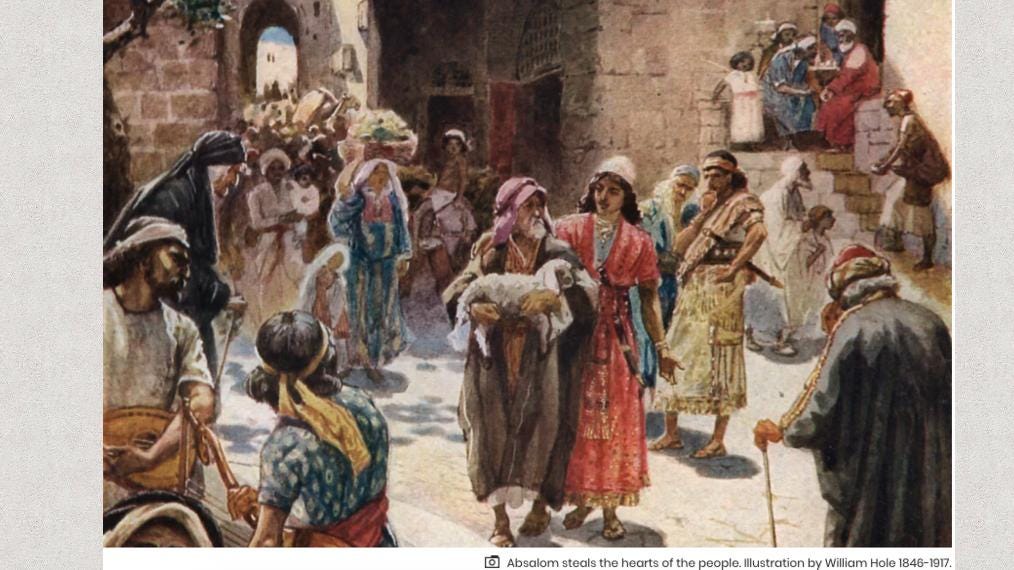Absalom's Rebellion: Lessons on Justice, Fatherhood, and Leadership
Monday, January 29, 2024, 4th Week in Ordinary Time
2 Samuel 15:13-14, 30; 16:5-13
In today's portion of the Bible, God's word to David regarding the "evil" coming out of David's house came to fulfilment. David's son, Absalom, stages a rebellion against him. David knew that, at that moment, he had no chance to stand up to his son and all the forces he had gathered on his side. So, David decided to buy some time by fleeing Jerusalem with those who remained loyal to him. As the king wept and walked barefoot up the Mount of Olives, a man named Shimei, a member of Saul's family, cursed and threw stones at David. He accused David of bloodshed and claimed that God had given the kingdom to Absalom.
Absalom's rebellion was more dangerous than Saul's attempt on David's life, but why did he rebel against his father? Absalom's story unfolds dramatically in 2 Samuel 13, where his beautiful sister Tamar was raped by their half-brother Amnon, and David did nothing about it. Harbouring deep resentment, Absalom bided his time and eventually orchestrated Amnon's murder as a form of vengeance, which led to his exile. Absalom spent three years in exile but eventually returned to Jerusalem, being forgiven by David. However, tensions between the two seemed to persist. Absalom indirectly indicated to all the people he met that under David's leadership, they would not be able to find justice (see 2 Sam 15:1-6).
Just like in the case of his sister Tamar, Absalom attempted to administer justice himself. However, the Bible does not tell us what form that justice would have taken, as Absalom's rebellion ended with his death. But the entire story reveals yet another flaw in David's character - a failed father who did not know how to manage his household. It also reveals that the portrayal of David as the ideal king of Israel is exaggerated. Absalom would not have been able to "still the hearts of the men of Israel" if there were no truth in the criticism of David's administration, which failed to listen to the just causes of the people.
Then, there is the case of Shimei, who insulted David in public. David's restraint and his order not to harm the man are indeed commendable. However, David neither forgot nor forgave Shimei for the public humiliation. On his deathbed, he ordered Solomon to hold Shimei accountable for his actions. After recounting the events of when he climbed the Mount of Olives and how he later promised not to harm the repentant Shimei, David instructed Solomon, saying, "Now therefore, do not hold him guiltless, for you are a wise man. You will know what you ought to do to him, and you shall bring his grey head down with blood to Sheol" (1 Kings 2:8-9).
In conclusion, the story of Absalom's rebellion and David's response reveals the complexities of familial relationships, the consequences of unresolved conflicts, and the limitations of human leadership. It serves as a reminder that even the most esteemed figures, like David, are flawed and capable of making mistakes. The narrative prompts us to reflect on the importance of justice, the responsibilities of fathers, and the consequences of holding grudges. Ultimately, it emphasizes the need for wisdom, forgiveness, and the pursuit of true justice in our own lives.




